Choosing the right contact center software can make or break your customer experience strategy. And if you’re looking to explore modern, mobile-first solutions, UJET is likely already on your radar.
UJET positions itself as a cloud-native contact center platform designed for digital-first businesses. With features tailored for in-app support and mobile experience, it’s built for companies that want to meet customers where they already are: on their phones and apps.
But is UJET the right choice for your organization, or would a competitor be a better fit for you?
We’re going to answer that question.
In this post, we’ll break down how UJET works, analyze what real customers have to say about the platform, compare pricing, and discuss a few top alternatives. By the end, you’ll have the information you need to confidently choose the contact center software that’s right for you.
What Is UJET and How Does It Work?
UJET is a telecommunications and call center software company founded in 2015. Headquartered in San Francisco, it specializes in delivering contact center as a service (CCaaS) solutions through a cloud-native platform designed specifically for mobile and digital channels.
UJET overview
Unlike legacy contact center platforms that were built decades ago and retrofitted for mobile, UJET was designed from the ground up with smartphones in mind. This architectural difference shapes how the platform, which was built for mobile and in-app experiences, operates. The cloud-based infrastructure means deployment doesn’t require on-premises hardware, and the platform includes virtual agent capabilities for handling routine inquiries automatically.
UJET offers support for multiple communication channels, including voice, chat, SMS, and multimedia sharing. This allows customers to send screenshots, photos, or documents directly within a support conversation, which is particularly valuable for technical troubleshooting or visual verification. The platform integrates with popular CRM platforms, such as Salesforce, Kustomer, and Zendesk, allowing support teams to access customer data without switching between applications.
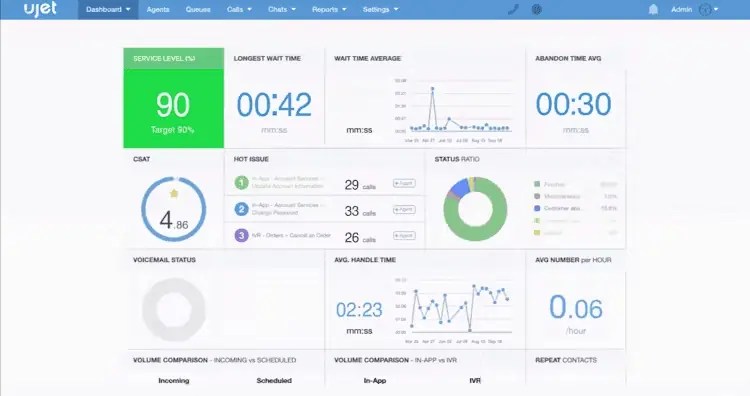
What Reviews Tell Us About UJET Features
While reviewing marketing materials is always a good start to help you understand what features and pricing a platform offers, nothing can tell the true tale quite like real customer feedback. We read over 100 user reviews from platforms like G2, Gartner, and TrustRadius, going beyond the overall rating to understand what customers loved (and definitely did not love) about their experience with UJET.
Ease of use
Many user reviews rave about UJET’s overall ease of use, praising its clean, intuitive design. The platform streamlines adoption times, potentially simplifies daily reporting, and shortens agent training time.
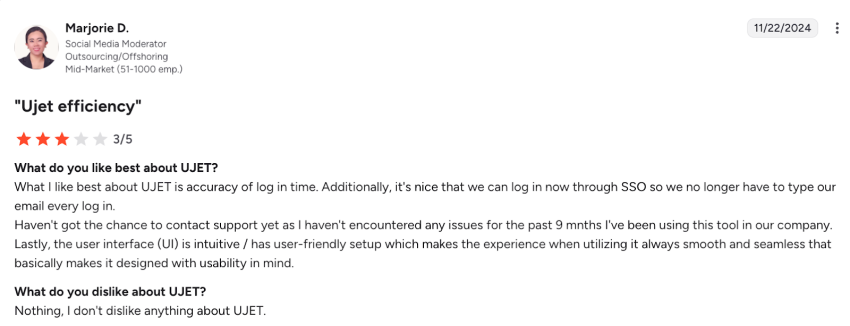
Some reviews also mentioned a learning curve, but it’s still considered easy to use once they get past the initial adoption.
Helpful and efficient
Beyond just being easy to use, many customers noted that UJET’s features actively improve their team’s efficiency. Features like consolidated reporting, real-time AUX status, and color-coded metrics save valuable time throughout the workday. Multiple agents noted faster workflows and easier troubleshooting compared to their previous systems. Additionally, visibility into key performance indicators is an asset for management and can enhance team motivation by making progress transparent and measurable.
At the same time, however, some users also reported difficulties logging in and out, problems accessing integrations, and that some functions were not working properly.
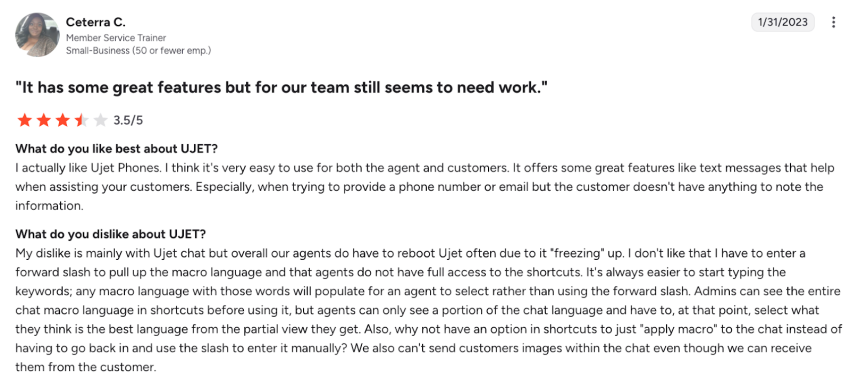
Features and functionality
UJET’s feature set focuses heavily on modern communication channels and customer experience improvements. In-app support, secure authentication, and multimedia channels all contribute to better customer interactions, which can help support teams resolve issues more effectively. The platform supports essential contact center features, including predictive dialing, warm transfer, interactive voice response, and call tracking. These capabilities cover the basics that most contact centers need for daily operations.
However, some reviews noted that UJET’s advanced analytics are limited compared to more established competitors. Organizations that rely heavily on sophisticated analytics for optimization may find UJET’s reporting capabilities insufficient for their needs.
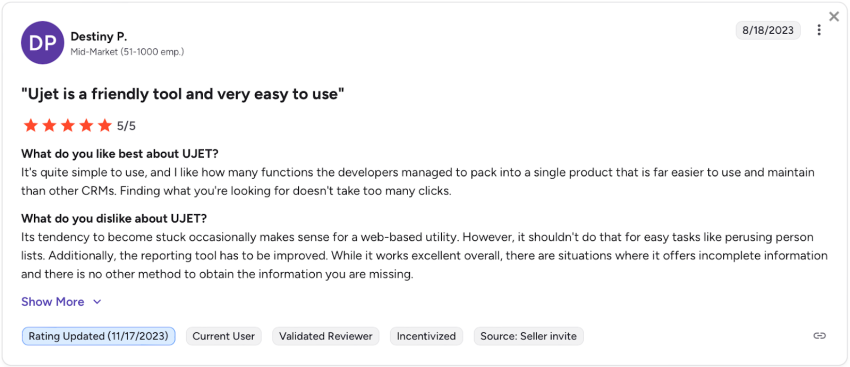
Performance and reliability
UJET generally receives positive feedback for reliability, particularly when internet connections are stable. Most users report that the platform works well in their day-to-day operations. That said, there are occasional reports of latency or lags, particularly during peak usage hours. Some customers have experienced glitches with notifications, persistent issues with pop-ups, or login problems that disrupt agent workflows.

Customer support
Customer experiences with UJET’s support team are largely positive. Many users highlight responsive, friendly support teams that are genuinely helpful when issues arise. Additionally, the implementation process receives particular praise, with customers noting smooth onboarding experiences and dedicated assistance during setup.
However, some customers also complain about long waiting times, which significantly impacts customer satisfaction.
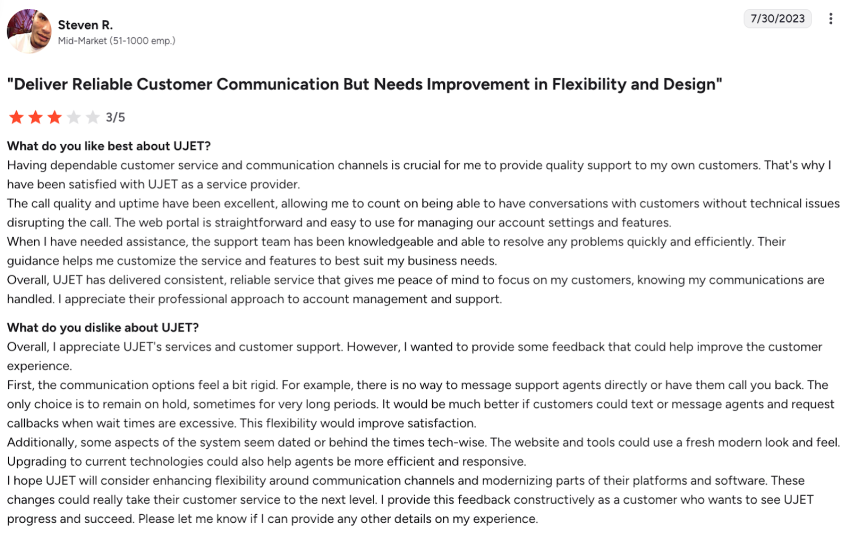
Pricing, Contracts, and Cost Fit
Understanding the true cost of any contact center platform requires looking beyond the advertised price tag. Let’s examine what potential buyers need to know about UJET’s pricing structure.
Pricing model
UJET doesn’t publish standard pricing on its website. Instead, it offers custom quotes based on specific needs and deployment size. This approach is common among enterprise CCaaS providers, though it makes early-stage shopping more time-consuming.
Custom pricing models typically account for factors like agent count, feature requirements, integration needs, and expected call volume. Based on our review and research, UJET positions itself competitively against established players like Five9 and Talkdesk.
Value assessment
For digital-first businesses that prioritize in-app experiences and mobile-native support, UJET can deliver strong value. The platform’s core strengths align well with companies that have already invested in mobile app development and want to create seamless support experiences.
However, some buyers have noted that achieving their desired functionality required additional integrations or add-ons beyond the base platform. This can affect the total cost of ownership, particularly when you factor in implementation time and potential third-party tools.

When evaluating value, consider not just the monthly per-agent cost but also implementation fees, required integrations, training time, and any add-ons needed to meet your specific use case.
Administration, Deployment, and Scalability
Flashy features are great, but the experience of actually implementing and managing a contact center platform matters just as much. Here’s what you need to know about UJET’s administrative capabilities.
Admin experience
Administrators generally appreciate UJET’s real-time configuration capabilities and flexible dashboard options. The ability to make changes on the fly without waiting for batch updates helps teams respond quickly to changing business needs.
That said, some admins have found the portal less intuitive for advanced reporting and complex configuration tasks, partially due to customization limits. Others noted more limited reporting overall. Teams with limited technical resources may also face a steeper learning curve for deeper customization.
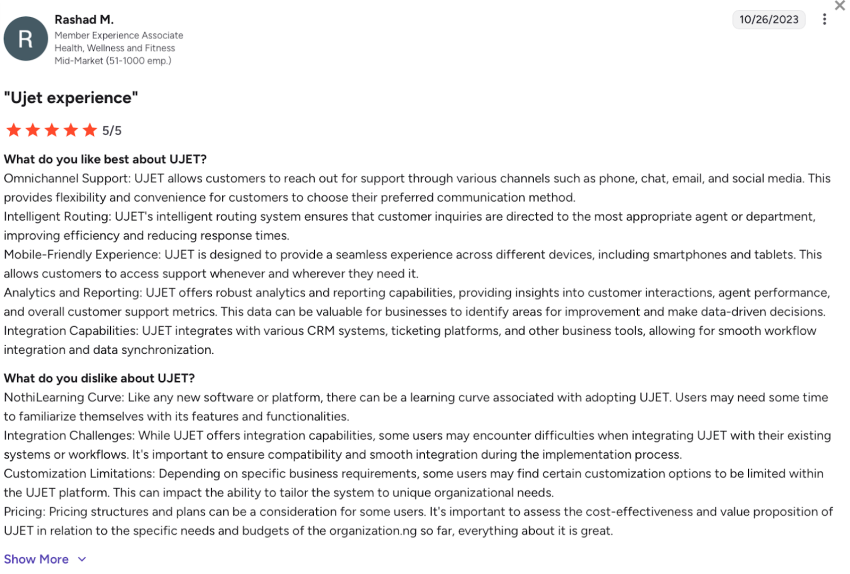
Deployment
UJET typically provides a smooth implementation process for small- and mid-market teams. The company offers strong onboarding support with dedicated customer success managers (CSMs) who guide new clients through setup and configuration.

Scalability
UJET’s elastic architecture, built on public cloud infrastructure, allows it to handle thousands of agents across global deployments. The platform can scale up or down based on demand, which is valuable for organizations with seasonal fluctuations or rapid growth trajectories.
However, our research suggests that UJET performs best for modern, cloud-native organizations rather than highly regulated industries with complex compliance requirements. Companies in traditional sectors or those with strict data residency needs may find the platform less accommodating than more established enterprise vendors.
Security and Compliance
Security isn’t optional in today’s contact center environment. It’s a fundamental consideration that should be kept in mind when selecting a CCaaS platform. Let’s examine how UJET approaches security and regulatory compliance.
Security features
UJET provides several security capabilities, including secure authentication, multimedia encryption, and customer validation tools. These features help protect sensitive information during all customer interactions, safeguarding both your customers and your business.
The platform integrates with enterprise single sign-on systems and compliance frameworks, allowing it to fit within your existing security infrastructure. This is particularly important for organizations with established identity management protocols.
Compliance certifications
UJET offers support for key compliance standards, including HIPAA, PCI, and GDPR. These certifications are essential for companies handling healthcare information, payment data, or European customer data.
However, full compliance may require additional configuration beyond out-of-the-box settings. Organizations in heavily regulated industries should budget extra time and resources for compliance setup and ongoing maintenance.
Summarizing the Reviews: Pros and Cons of UJET
Based on our comprehensive review of customer feedback and UJET’s platform capabilities, clear patterns emerge around what works well and what falls short.
The pros include:
- A user-friendly interface with intuitive navigation that reduces training time and speeds up agent adoption
- Strong mobile-first and in-app features that align well with modern, digital-first customer service strategies
- Consolidated reporting and metrics visibility through real-time dashboards that help supervisors track team performance
- Responsive onboarding and support with dedicated CSMs guiding implementation
- Efficiency-boosting features like color-coded metrics and real-time AUX status that streamline agent workflows
The cons include:
- Notification glitches and persistent pop-up issues that can disrupt agent productivity
- Occasional latency and call drops, particularly during peak usage hours or with less stable internet connections
- Underdeveloped advanced analytics compared to more established enterprise competitors.
- Customization limitations that make complex reporting and advanced configuration more difficult
- Additional costs beyond the base platform, as desired functionality often requires integrations or add-ons
Who UJET Is Best For
UJET is a reliable cloud contact center platform. It’s not a universal solution (because no CCaaS platform truly is), but it can be a great option for certain types of organizations. Let’s discuss who should choose UJET.
Digital-first enterprises
Companies that prioritize mobile, app-based customer experiences will likely be very happy with UJET. If your customers primarily interact with your brand through mobile apps, UJET’s in-app support features create seamless experiences that traditional phone tree systems would struggle to match.
Mid-market CX teams
Mid-market teams — typically with 50–500 agents — that value reporting, ease of use, and agent productivity may find UJET’s feature set suitable for their needs. The platform is sophisticated enough that even professional contact centers can leverage it, and it doesn’t have the sometimes-overwhelming complexity of enterprise platforms.

Who Should Consider Alternatives?
Despite UJET’s strengths, several types of organizations may be better served by alternative platforms.
Buyers needing deep analytics
If your organization relies on sophisticated analytics for workforce optimization, quality management, and performance prediction, UJET’s analytics capabilities may feel limited. Platforms like Nextiva, NiCE, and Genesys offer more mature analytics tools with deeper business intelligence features.
Highly regulated enterprises
Organizations in regulated industries like healthcare, financial services, or government sectors will likely benefit from another tool. These industries have strict compliance requirements and may need more mature frameworks and redundancy options than what UJET currently provides.
Look for providers with dedicated solutions that align with your compliance requirements. Nextiva, for example, is compliant with HIPAA and PCI.
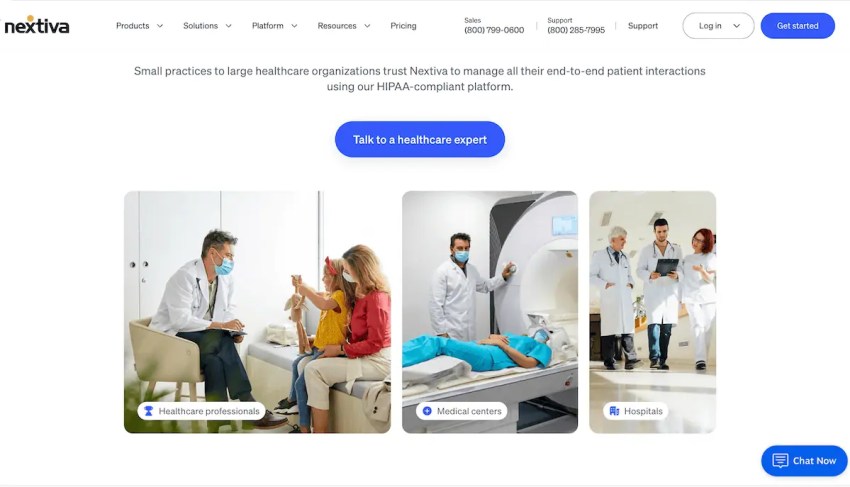
Cost-sensitive SMBs
While UJET can work for smaller organizations, its feature set and pricing model are optimized for companies willing to invest in modern, mobile-first capabilities. Budget-conscious small businesses that primarily need basic phone support might find more cost-effective options elsewhere.
Top Alternatives to UJET
Whether you’re feeling confident about UJET or still undecided, it’s always a good idea to understand what other options are out there. Let’s take a look at the top four UJET alternatives to consider.
Nextiva: Best overall alternative
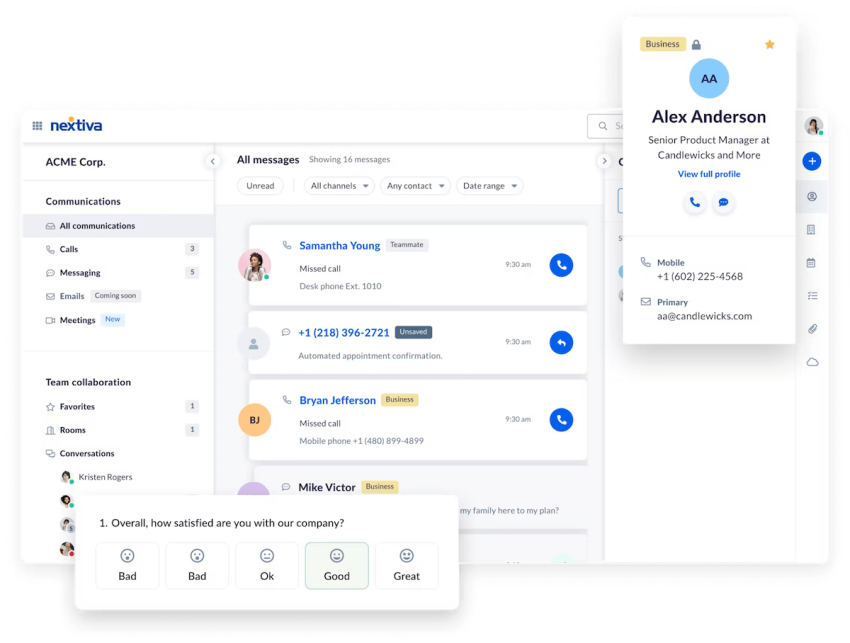
Nextiva offers an all-in-one UCaaS and CCaaS platform that combines robust contact center features with unified communications, making it easier to manage all your business communications from a single provider.
Standout features include:
- Advanced AI capabilities for intelligent routing, sentiment analysis, and automated insights that help you optimize handling times and improve customer satisfaction
- Comprehensive reporting and analytics with customizable dashboards that give supervisors real-time visibility into performance metrics
- Consolidated billing with no surprise add-on fees for core features
- 24/7 award-winning support for all plans, ensuring you’re never left without help during critical situations
- Multi-channel messaging, including voice, SMS, chat, email, and social media, all managed from a unified interface
- Built-in workforce management tools to optimize scheduling, forecasting, and agent productivity
- Highly customizable routing that ensures callers reach the right agent based on skills, availability, and customer context
- Dedicated solutions for healthcare and other regulated industries, with built-in compliance features
Nextiva scales seamlessly whether you’re a small business with five agents or an enterprise with thousands, and our strong reliability and striving for 99.999% uptime mean that you can count on our service for all business-critical communications. Our platform handles both inbound and outbound calls efficiently, and the native integration between unified communications and contact center features eliminates the complexity of managing separate systems.
Talkdesk
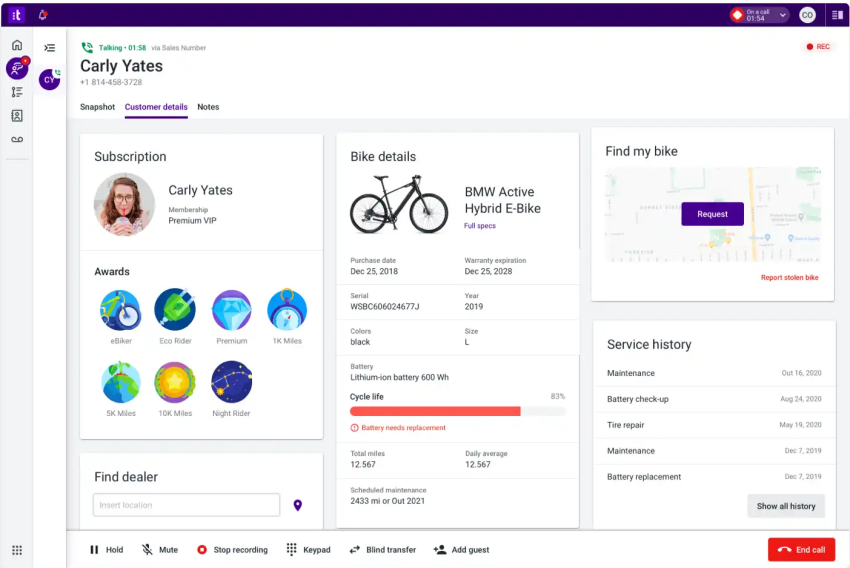
Talkdesk is an AI-powered CCaaS platform known for its extensive analytics and workforce optimization capabilities. It offers sophisticated tools for understanding customer interactions and improving agent performance, making it a good fit for organizations looking to introduce AI features into an on-premises contact center.
Key features include:
- Advanced analytics and reporting beyond basic metrics
- Strong workforce optimization and forecasting
- AI-powered automation that routes callers to the most appropriate agents
- Comprehensive omnichannel functionality
Talkdesk’s pricing is high, starting at $85 per user per month. While some companies can afford the cost, it can be prohibitively expensive for others.
Considering Talkdesk, but not sure if it’s right for you? Check out these Talkdesk alternatives.
Five9
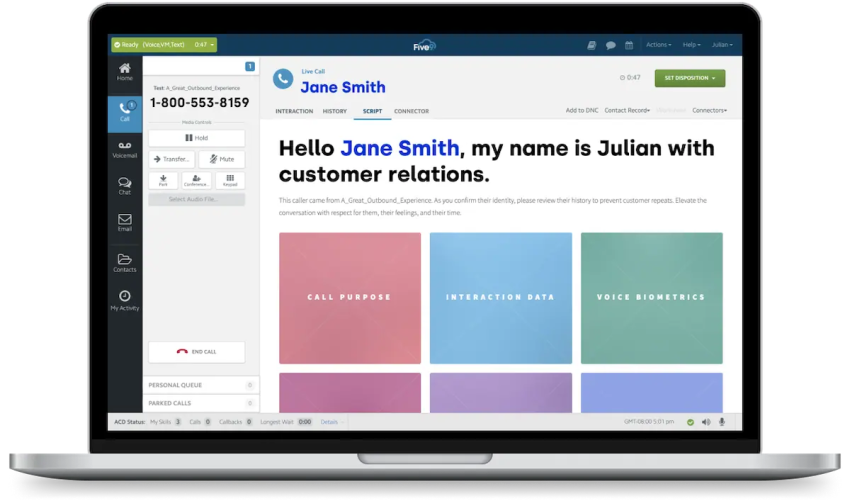
Five9 excels at both inbound and outbound call operations, making it particularly attractive for sales teams and organizations with significant outbound call requirements.
Notable capabilities include:
- Powerful predictive dialer for outbound campaigns
- Strong omnichannel routing and queue management
- Blended inbound and outbound agent capabilities
- Integration with major CRM platforms
- AI Agent Assist features to streamline workflows
Like Talkdesk, Five9 is scalable and has similar AI conversation analytics features. However, it’s not the right fit for everyone, so you may want to check out additional Five9 alternatives for more options.
Genesys Cloud CX
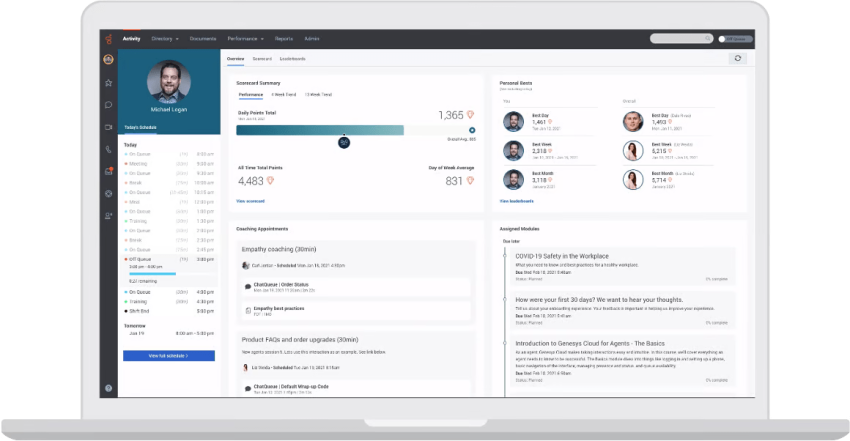
As an enterprise CCaaS leader, Genesys Cloud CX delivers broad automation and AI capabilities along with extensive integration options for large, complex organizations.
Key strengths of Genesys include:
- Comprehensive automation across customer journeys
- Deep AI capabilities for predictive routing and insights
- Strong partner ecosystem with thousands of integrations
- Robust tools for enterprise-scale deployments
Genesys pricing is high, with costs starting at $75 per user per month. Compared to platforms like Nextiva, which offer much more cost-effective plans, Genesys is not affordable for many businesses.
Considering Genesys? Take a look at a Five9 vs. Genesys comparison.
Buyer Checklist and Evaluation Questions
When you’re actively evaluating UJET or any contact center platform, having a structured approach helps ensure you make the right decision for your specific needs.
Pilot plan
During your evaluation period, focus on testing these critical areas:
- Test notification reliability and reporting features: Set up real workflows and monitor whether agents receive timely notifications without glitches. Assess the reporting interface to confirm it provides your KPIs.
- Assess load performance during peak usage: If possible, conduct testing during your busiest hours or simulate high-volume scenarios. Contact center platforms can perform very differently under load compared to controlled demos.
- Validate CRM integrations: If you use Salesforce, Kustomer, or another CRM, test the actual integration with your real data. Verify that customer information syncs correctly and that agents can access what they need without friction.
Vendor questions
When speaking with UJET’s sales team, ask these clarifying questions:
- How are advanced features licensed? Which functions come standard, and which require upgrades or add-ons?
- What SLAs exist for uptime and support response? Get specific guarantees in writing, not just verbal assurances.
- How does the platform handle compliance in regulated industries? If you’re in healthcare, finance, or another regulated sector, understand exactly what configuration is required.
Red flags
Watch for these warning signs that might indicate UJET isn’t the right fit:
- Reports of disruptions to agent workflows, including bugs and intrusive pop-ups
- Limited analytics capabilities out of the box, requiring expensive third-party tools
- Pricing opacity and heavy reliance on add-ons that aren’t clear until late in the sales process
What Our Analysis of UJET Reviews Adds Up To
UJET delivers a modern, mobile-first CCaaS platform that resonates strongly with digital-first brands. The platform’s clean design, agent efficiency features, and in-app support capabilities make it particularly attractive for companies with a strong mobile app presence.
Real customer reviews highlight meaningful strengths around ease of use and intuitive interfaces that reduce training and adoption time. This makes it appealing to organizations that prioritize modern customer interactions over legacy phone systems.
However, there are ongoing concerns and multiple customer reviews noting glitches, latency issues, and missing features. These reports suggest the platform may not be ready for businesses where every interaction matters. Organizations that can’t afford dropped calls or notification failures should carefully weigh these reported challenges.
For businesses needing enterprise-grade reliability, comprehensive analytics, and transparent pricing with no surprises, Nextiva represents a safer long-term investment. Our platform combines the modern features you need with the proven stability and support your business depends on.
Ready to see what a truly reliable contact center platform looks like? Explore Nextiva’s CCaaS solution and discover why businesses trust us with their most important customer interactions.
Relationships start with a conversation.
Seamlessly manage all of voice, video, messaging with customers and teams on a unified platform with a real-time dashboard that tracks call activity.

















 VoIP
VoIP 









